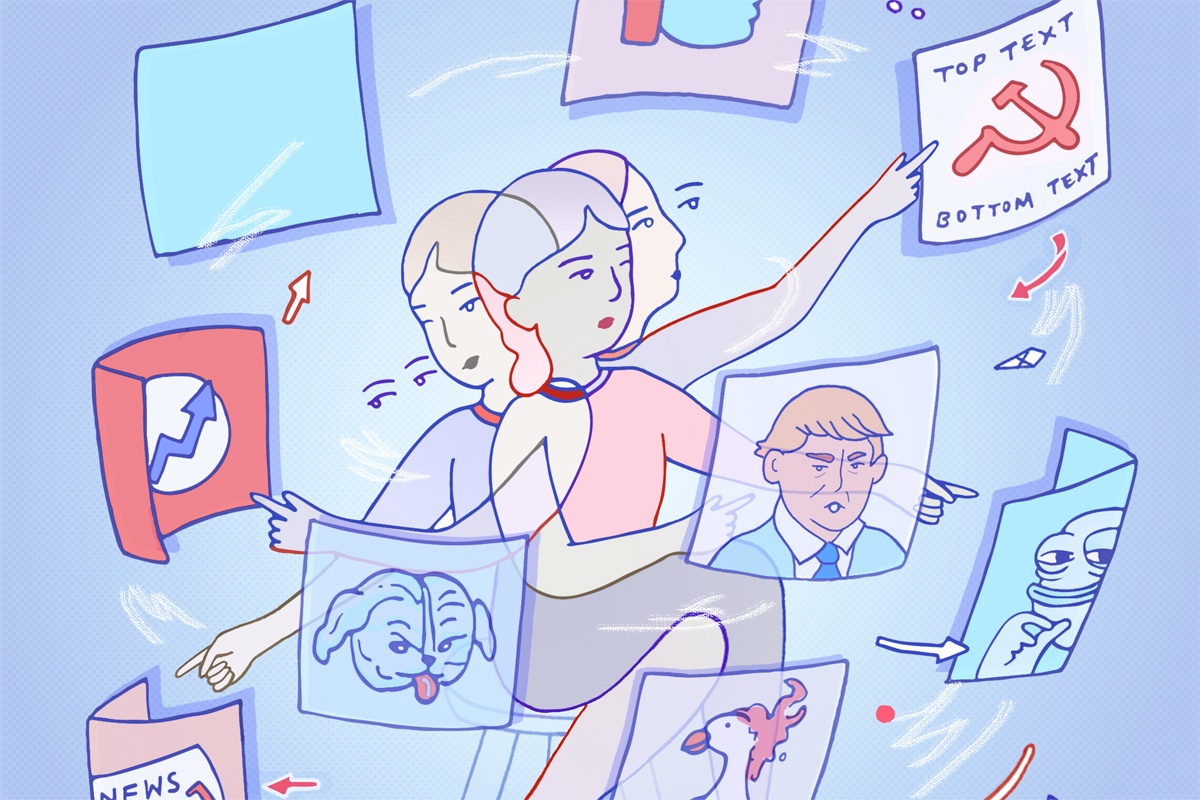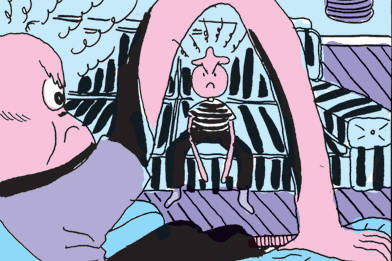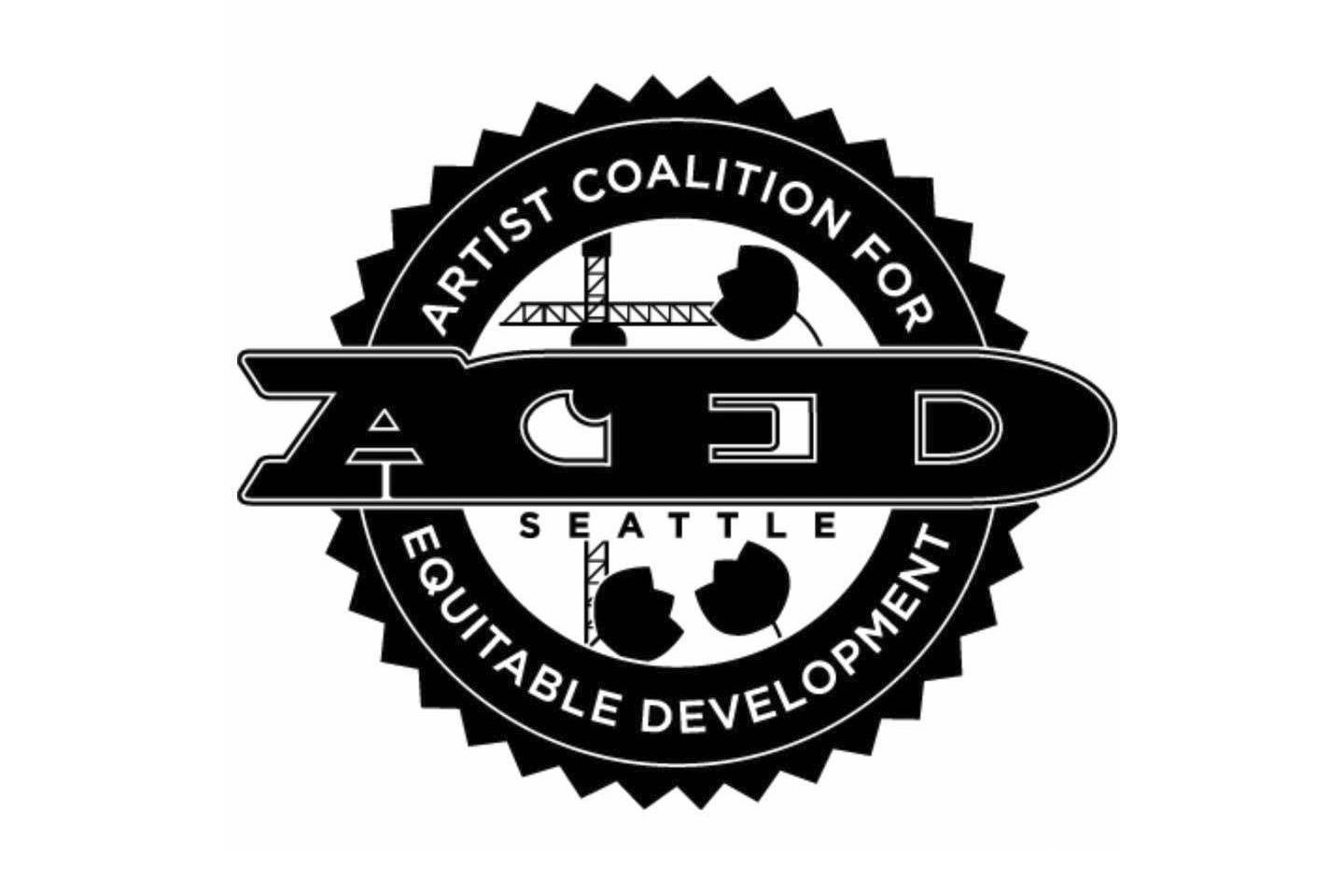“I think the computers have complicated lives very greatly. The whole, you know, age of computer, has made it where nobody knows exactly what’s going on.”
—Donald Trump, Dec. 29, 2016
The night of Donald Trump’s electoral victory, as journalists and pollsters sat stunned, alt-right trolls on the online imageboard 4chan were declaring ecstatic victory. The election outcome was, for them, the culmination of a long-orchestrated campaign they had dubbed “The Great Meme Wars.” “Will we ever experience something this great again?” an anonymous poster wrote on the site’s “politically incorrect” imageboard, the post accompanied by a twist on one of the site’s more popular characters, Wojak—the character’s MS Paint-rendered visage outfitted in Nazi SS gear. “The meme wars of 2015/2016 are over and we are the winners.”
Who were these self-declared winners? A bizarre allegiance of online trolls, experts at manufacturing memes—the jokey, absurdist images, often overlaid with text, that are copied and spread endlessly with slight variations by people online. Through memes and the clandestine net spaces they used to share them, these trolls met and formed a Frankenstein political bloc out of adult My Little Pony fans, furries, anime enthusiasts, self-described “masculinists,” disgruntled video gamers, Neo-Nazis, white nationalists, xenophobes, neo-monarchists, reactionaries, old-school racists, and nihilists in search of edgy lols. They were coronated the “alt-right” by white nationalist “leader” Richard Spencer, and referred to Trump as “God Emperor” on Reddit, where they made the r/The_Donald forum into one of the most popular on the hugely popular news and web content aggregation site.
As trivial as it may seem, The Great Meme Wars and the chaos it wrought on social media likely had a very real effect on the 2016 election. By weaponizing their memes, berating their targets with aggressive rhetorical strategies, and generally acting as outrageously as possible, the so-called alt-right gained the acknowledgement of both Hillary Clinton and Donald Trump, hijacked the mainstream media, and dragged the national Overton Window toward their extremist views in the process—all from the safely removed distance of their crusty keyboards.
They may have won the battle, but according to their opposition—some of which is located in the Northwest—the Great Meme Wars are far from over.
“I try to clean up messes, but I also try to create them,” a woman named Addy says over the phone as she prepares to relocate from her lifelong home in the Midwest to the Northwest, where she says she will be “safer.” The line goes silent for a moment—the sound of distant gulping and a staticky video barking something about counter-terrorist operations in the background. “I’ve got to tell you something real quick as I chug my Mountain Dew, because yes, I’m a memer. I’m not the alt-right, but I still drink Mountain Dew. Anyways, yeah, I actually consider myself more of a ‘social hacker’ than a memer. Every hacker is either addicted to chaos or addicted to order. I myself am addicted to chaos, but I’m chaotic good.”
Before she came out as a trans woman, Addy (who asked Seattle Weekly to withhold her last name) spent a lot of time on 4chan and took part in the same early troll culture that would, many years later, form the alt-right. “I was the embodiment of 4chan,” she says. “I would say anything just to get a rise, do anything just to get a rise. I don’t even feel comfortable talking about the person I used to be.” Then something changed. Addy’s sibling married a black woman; along came two new black nieces; and soon Addy had a biracial child of her own. “I started realizing I was a racist, a sexist, all these things. It wasn’t hard to admit that—it was empowering to admit that, because once I did, I could destroy it. I’ve been on a warpath ever since.”
She left 4chan and began spending more time in another meme-making community she found on Facebook. There she would start her own page to distribute her own memes. She named the page Lettuce Dog and adopted a logo that is, indeed, a head of lettuce fashioned to look like a dog. Just a month after Addy began Lettuce Dog, in the fall of 2015, she had amassed 9,000 followers. Today, roughly a year, four months, and 1,700 memes later, that number has grown to 93,000. On a decent week, Lettuce Dog’s memes will reach 1 to 3 million people using the same troll tactics Addy learned from 4chan and often sparking fierce political debate in the comments.

Take one simple meme she made in November. Featuring a stock photo of two Jet Ski riders carving through ocean waves, a message is written in goofy blue font: “It’s time to get EXTREME about destroying white supremacy.” The nonsensical image was liked by 2,100 people, shared over a thousand times, and resulted in conversations between Addy and upset commenters about white guilt and the definitions of racism and white supremacy.
According to Addy, when she began Lettuce Dog on Facebook, there were only two types of meme pages. “There were really stuffy, obnoxious social-justice-warrior pages—completely humorless, very angry white allies complaining about things,” she says. On the flipside there were “dank” meme pages—pages that “were on so many layers of irony, just totally out there, playing with the human mind.” With Lettuce Dog, Addy had decided to combine the two forms and create what is likely the first “dank social-justice page.” Countless others followed the same path until dank social-justice pages constituted their own subculture, known as “Weird Facebook.” As a collective, these pages reach somewhere in the tens of millions.
While plenty of Weird Facebook pages are largely apolitical, the community overall tends to have a far-left bent—its memes are often anti-capitalist, fiercely pro-LGBTQ, social-justice oriented, and sit on a spectrum that ranges from anarchist, Democratic socialist, socialist, and Marxist to full-on communist. Collectivism is a central tenet of Weird Facebook. “Individualism is terrible and inevitably going to die,” says Addy, who self-identifies as an “anarcho-collectivist,” but isn’t shy about espousing explicitly communist values and ideas in her memes.

Via Lettuce Dog
Weird Facebook content creators typically don’t care to take credit for their work, preferring to remain anonymous while posting to pages with names like “Gangster Popeye,” “G a Y L O R M O O N S a Y S” or “I play KORN to my DMT plants, smoke blunts all day & do sex stuff.”
The community is also structured in a collectivist framework—they don’t compete, but share each other’s content freely, cooperating in an effort to drive fans to each other’s pages and help grow each others’ audiences. They do this because memes live and die by the masses, their strength and potency directly tied to how many people are engaging with them rather than the prestige of any individual creator.
By their very nature, memes represent a violation of traditional notions of “ownership.” Everything from trademarked intellectual properties, pop-culture detritus, watermarked stock photos, random cyber-garbage off Google images, and AP news photos to the very structure of past memes themselves are on the table for endless remixing by the masses who share them and participate in their creation. As a result, “normies,” as meme-culture outsiders are called, might not even be able, at first glance, to decode a meme—the result of a cascading, mutating series of Dadaist in-jokes and symbols whose agreed meanings that, while somewhat fixed, are also incredibly fluid, largely guided by their makers’ intuition rather than any logical plan.
“When you log into the Internet, you’re plugging your brain into millions, billions of other brains,” Addy says. “The Internet is a giant brain, just like a neural network.” She claims her most popular memes have come to her in visions not unlike those of religious mystics. “Sometimes I feel like the Internet wills me to make certain memes, like I’m plugged directly into the zeitgeist.”
Addy isn’t the only meme-maker at Lettuce Dog. Like most of the other Weird Facebook pages, hers has a decentralized structure with a number of administrators, a collaborative practice that results, often intentionally, in a more diverse array of voices.
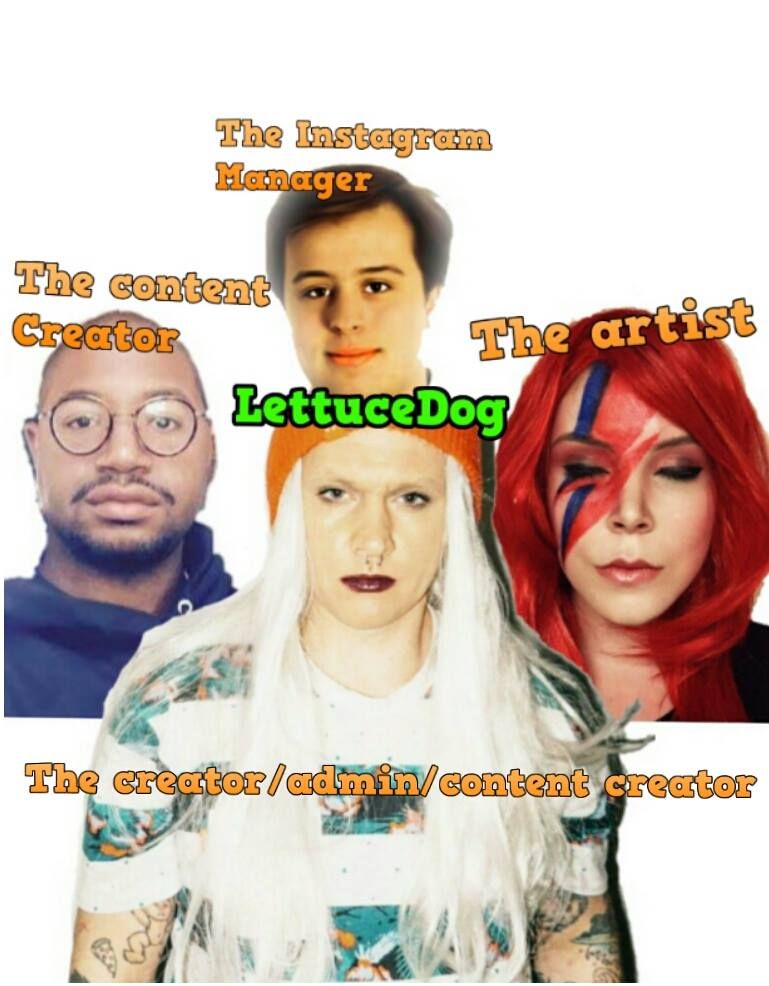
Although it’s impossible to know the racial or gender makeup of the alt-right or trolls in general due to their anonymity, researcher Whitney Phillips, who spent six years infiltrating, observing, and interacting in troll spaces for her 2015 book This Is Why We Can’t Have Nice Things: Mapping the Relationship Between Online Trolling Culture and Mainstream Media, notes that “what is empirically verifiable, however, is the observable fact that trolling behaviors are gendered male, are raced as white, and are dependent upon a certain degree of economic privilege.” Alt-right politics, while all over the place, hinge largely on white identity politics—thus the opposition on Weird Facebook often relies on and prides itself on its rainbow coalition of counter-trolls to fight those same tactics.
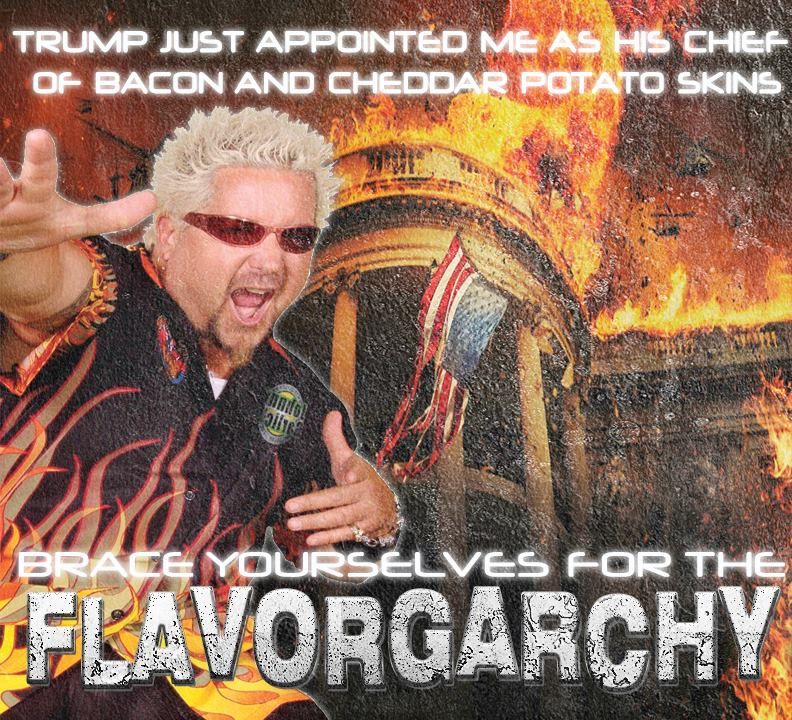
Via Cory in the Abyss
In addition to Addy, a white trans woman, Lettuce Dog’s three other contributors are a digital artist (a white cis-woman), an Instagram manager (a white cis-man), and a black meme-maker named Cory in the Abyss, who runs his own Weird Facebook page as well.
After admiring each other’s memes and their shared politics, Addy reached out to Cory and asked if he would join the Lettuce Dog team as a writer/content-creator, agreeing to cross-post his page’s memes to hers as payment. “It’s a really intersectional process,” Cory tells me. “I’m not up on trans issues, so Addy kind of makes trans issues more visible for me. On the other hand, I help her see race issues in a way a white person might not see them. So we compliment each other’s shortcomings politically, but it’s all propelled generally in that same far-left direction.”

Via Lettuce Dog
Cory started making memes after growing frustrated with his original arts medium of choice: poetry. “I felt frustrated with its ivory-tower elitism,” he says. “With a poem, you might get published in a journal, and then a few people in academia might read it. When I make a meme, I post it, and almost right away it reaches thousands, sometimes hundreds of thousands of people. It’s immediate, and honestly, probably the most pragmatic way to reach people now.”

Via Cory in the Abyss
Another Weird Facebook page called Eses Be Wilin was born of a similar spirit. “A friend of mine from central California started the page, and I asked to join as an admin when it had maybe 100 likes,” Jorge Bustamante (who asked Seattle Weekly not to use his real name), tells me from his Seattle home. A “Latinx ghetto cultural empowerment” page, it has amassed 27,000 followers in the year it’s been up.  “Eses Be Wilin started in the midst of the Trump campaign—I got involved because I feel like Latin American oppression arises every election cycle, and I wanted to show that what many might perceive as the bottom of the barrel of Latin culture is actually a very rich culture. There’s a lot of Chicano pride pages on Facebook, but we were the first to bring meme-ing to that culture and that audience, which is why I think the page took off so quickly.”
“Eses Be Wilin started in the midst of the Trump campaign—I got involved because I feel like Latin American oppression arises every election cycle, and I wanted to show that what many might perceive as the bottom of the barrel of Latin culture is actually a very rich culture. There’s a lot of Chicano pride pages on Facebook, but we were the first to bring meme-ing to that culture and that audience, which is why I think the page took off so quickly.”
Bustamante and his friend began with a central-Californian Chicano cultural focus, but they quickly added a Dominican admin, a Puerto Rican admin, and a Guatemalan admin in an effort to represent the wider Latin American experience. Like Lettuce Dog, Eses Be Wilin peddles primarily absurdist-humor memes, but sprinkles in memes with political, resistance-oriented motifs as well—memes that address Western imperialism, colonialism, police violence, the Zapatista movement, and the United Farm Workers movement.
Though Trump was the main reason Bustamante felt prompted to make memes about Latinx culture, he chose the form as his medium for a separate reason—declining faith in mainstream media’s issues coverage. “One [outlet] I stopped following recently is CNN,” he says. “I used to read them every day, but I haven’t in months because during the election cycle, the front of their website every day was some inconsequential shit regarding e-mail scandals or some mean thing Donald Trump said. That was it, just the same shit back and forth. There was nothing to learn at that point—I started to feel like real news was becoming inaccessible. I think that’s why a lot of people are turning to memes.”
Media analyst Andrew Tyndall released a report on Oct. 26 noting that from the beginning of 2016 to the time of its publication, ABC’s World News Tonight, the CBS Evening News and the NBC Nightly News had devoted a mere 32 minutes total to issues coverage—defined by Tyndall as coverage which “takes a public policy, outlines the societal problem that needs to be addressed, describes the candidates’ platform positions and proposed solutions, and evaluates their efficacy.”
What dominated instead? The endlessly controversial exploits of Donald Trump, who earned 327 minutes of coverage, a third of the year’s total airtime, and “more than the entire Democratic race combined.” Tyndall’s report focused on only three major broadcast news programs, but Donald Trump’s stranglehold on the media’s attention across the board—print journalism, web journalism, blogs, television, radio, mainstream media, independent media, alternative media—and the corresponding lack of substantive issues coverage were observable to anyone who consumed any kind of news this past year.
In her book, Phillips proposes a somewhat radical thesis about the media and trolls. The trolls who lurk on Facebook, Reddit, 4chan, and Twitter spewing vile racist, xenophobic, and misogynistic transgressions—the ones the media consistently deride as societal outsiders—actually fit very neatly into the contemporary cultural landscape. In fact, they simply mirror the methodologies of a mainstream media that thrives on controversy. “Not only do these outlets give trolls precisely what they want—specifically, a national platform—they validate the impulse to troll,” Phillips writes. “As sensationalist media have proven again and again, these behaviors work, and not just for trolls. The behaviors also work for mainstream media companies, since stories about trolling translate into page views, and page views translate into advertising revenue, and advertising revenue is the lifeblood of any successful media organization.”
Trump laid out his understanding of this very phenomenon—albeit in its analog form—three decades ago in his memoir The Art of the Deal: “One thing I’ve learned about the press is that they’re always hungry for a good story, and the more sensational the better. The point is that if you are a little different, or a little outrageous, or if you do things that are bold or controversial, the press is going to write about you.”
In fact, many in the alt-right refer to The Art of the Deal as The Art of the Troll.
Trolls hit the big time—with assistance from the media—on Sept. 12, when hillaryclinton.com published an article with the subhead “That cartoon frog is more sinister than you realize.” The frog in question was Pepe—who began his life in Matt Furie’s Boy’s Club comic series from the mid-2000s, a collection of which was published last year by Seattle publisher Fantagraphics. The comics follow the stoneriffic adventures of four anthropomorphic animal roommates. In one comic from 2008, Pepe is caught peeing with his pants all the way down. When confronted by his roommate about it, he responds, “feels good man.” Pepe’s smiling frog head, with the words “feels good man,” became an innocent icon on the Internet and a fixture of early meme culture, endlessly remixed onto countless bodies expressing a range of emotions (“feels bad man”).
But on 4chan, Twitter, and r/the_donald, an army of “alt-right” trolls began churning out an incredibly high volume of incendiary “smug” Pepes (Pepe smirking with his hand on his chin). Some were simply of green, Pepe-fied Trumps or Pepes wearing red “Make America Great Again” hats, which Donald Trump and Trump Jr. both retweeted. But many more were Nazi Pepes—Pepe as Hitler, Pepe as SS officer, Pepe holding guns to the heads of minorities and women, and Jew Pepes, drawn in the style of anti-Semitic WWII propaganda posters.
With the help of Pepe’s cartoon grin, the alt-right was winning.
“For the past year and a half, they destroyed us in memes,” Bustamante says. “They beat everyone in memes this past election—they made so many, they made more than us, they made so many effective ones. They were better content creators. It doesn’t matter if they’re politically inept or living in their mom’s basement, what matters is they’re outwardly expressing this train of thought, bringing together people with vaguely similar interests to congregate in the same space on the Internet.”
The sheer volume of these memes yielded real results—the unparalleled level of activity most evident in the engagement on r/the_donald. Thanks to Reddit’s algorithm, the questionable content at play on that subreddit was thrust to the front page. The domination was so intense that Reddit decided to change the algorithm on June 15 in an attempt to present its general users with some semblance of variety.
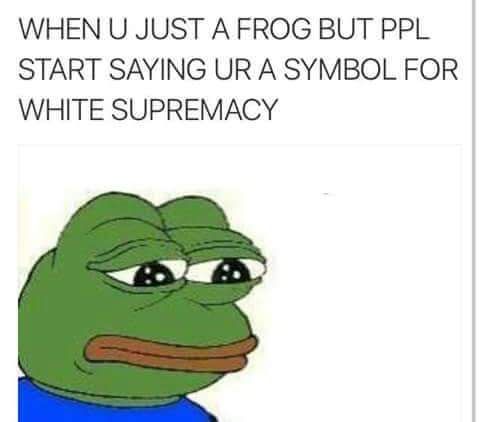 All of this, of course, was “just about having fun,” as alt-right media platform Breitbart wrote in March. Then Clinton declared that Pepe the frog was a white nationalist symbol, akin to a swastika. In one fell swoop, she both legitimized a band of trolls and officially handed it sole ownership of a powerful meme. “Everything has been weird since the day Hillary talked about Pepe,” Bustamante says. “I think that was a very dark time for memes. From that point on, everything the alt-right did was validated.”
All of this, of course, was “just about having fun,” as alt-right media platform Breitbart wrote in March. Then Clinton declared that Pepe the frog was a white nationalist symbol, akin to a swastika. In one fell swoop, she both legitimized a band of trolls and officially handed it sole ownership of a powerful meme. “Everything has been weird since the day Hillary talked about Pepe,” Bustamante says. “I think that was a very dark time for memes. From that point on, everything the alt-right did was validated.”
Two weeks later, the Anti-Defamation League officially filed Pepe the frog as a hate symbol. The alt-right were thrilled at the “triggered” media. The Hill, Vanity Fair, Talking Points Memo, CNN, The Economist, MSNBC, and countless others took the bait, drawn to the story’s literal cartoonish extremes. Suddenly swastikas were everywhere, and the alt-right, previously a fringe web group, was a household name.
The coup, in turn, further revealed the increasingly low bar of mainstream media coverage. In one instance, Chris Matthews on MSNBC exclaimed that “the green guy there has become a popular symbol of white nationalism—I didn’t know this! I’m learning! […] I know none of this stuff! But I now know it. I just learned it today,” admitting his lack of knowledge and context of the meme in a rush to brand it a hate symbol. The first article that comes up in a Google search of Pepe, a Los Angeles Times article on Pepe as a hate symbol, doesn’t even get the name of Furie’s comic correct, calling it Boy’s Life, similarly exhibiting a lack of real knowledge or insight while simultaneously handing its ownership to the alt-right. Following the newfound legitimization, white nationalist Richard Spencer seized a media spotlight and became a “spokesperson” for the “movement,” which until then had been little more than an online mob.
Soon after the Pepe episode, it was revealed in The Daily Beast that Palmer Luckey, the almost-billionaire creator of the Oculus Rift virtual-reality headset, which is Facebook-owned and has offices in Seattle, was the secret backer of a pro-Trump, anti-Hillary “meme magic” nonprofit campaign called Nimble America which filed for a 501(c)(4) in September. Inspired by the success of the provocative Pepes, Luckey sought to fund a group of meme-making trolls he was in contact with so they could churn similar content out on social media full-time. Posting on r/the_donald as “NimbleRichMan,” Luckey wrote “we’ve proven that shitposting is powerful and meme magic is real. So many of you have asked us, how we can bring this to real life,” promising to match donations to the upstart meme organization dollar for dollar.
“There’s all this ‘fake news’ now,” Cory in the Abyss says, “and in a way we’re also ‘fake.’ The difference is, with our memes, we have an agenda, and there’s no pretense about those agendas. The exciting thing about memes now is that we’ve kind of become like pirate news—we don’t represent an institution or an establishment. The left can troll too.”
While the alt-right may have outpaced the left in the first battle of the Great Meme Wars, Weird Facebook has seemingly become the most formidable, viable challenger to the movement’s nihilistic, irony-drenched tactics. Many collectivist memers revel in the historical precedent the communist Soviet Union set on the Eastern front in WWII when defeating the Nazis’ fascist empire—images from which admins of Weird Facebook often weaponize as memes in their own battles against the alt-right. But as Phillips wonders in her book, if “certain forms of trolling can be justified, is the righteousness of a particular act compromised if it replicates precisely the cultural logics it seeks to dismantle?”
According to Lettuce Dog, the answer is a firm yes. “So, remember, I’m chaotic good,” she says. “Trump and the alt-right are chaotic too—chaotic evil.”
For Addy, a core value separates Weird Facebook’s trolling tactics from that of the alt-right’s. “I’ll intentionally make a meme that I know will stir a lot of controversy and anger a lot of people,” she says, “but with the express purpose of empowering marginalized people.” Early on, when Lettuce Dog was first gaining in popularity, Addy posted a meme that began to get “tons of shares.” Although the meme was well-intentioned, as most of hers are, when a Mexican man reached out and explained to Addy why he thought the meme was offensive, she had to make a fateful decision: “Should I be a white asshole, tell him to shut up, and keep the successful meme rolling? Or should I not be a prick, and make another that’s less offensive?”
The answer wasn’t obvious at first. Her time in the extreme, taboo-breaking culture of 4chan had trained Addy to place edginess above all else. But she decided she was done with that. “I deleted it, apologized to him, and have continued to run my page that way,” she says. “Now with the Internet, we’re all sharing one collective mind, so to hurt any part of that collective is to hurt the whole collective—to harm me. The 13-year-olds typing the n-word on YouTube don’t understand how much they’re hurting themselves.”
The alt-right is seemingly of a different mind when it comes to such empathy. Yet there is another area where Addy and her fellow memers hope to replicate their enemies: how to harness memes to hijack the media, use it against itself, and seize a national platform for their politics. “We don’t want to be edgy in a troll-comment way,” says Lettuce Dog admin Cory, “but edgy in that our memes stand on the edge of many different seams, make you think, and hopefully push you towards a better ideology. I think they’re the cultural foundation—the memes are the pre-body politic.”
And indeed, the loletariat did begin to rise just this past weekend. The Meme Wars took a turn on Inauguration Day, when an assault on Richard Spencer was caught on camera. During an interview, the alt-right “leader” was punched in the face by a masked member of a black bloc. In an act of “meme magic,” the punch landed right as Spencer was beginning to explain the enamel pin on his lapel— “It’s Pepe, he’s become kind of a symbol … ” Smack!
In less than 24 hours, the clip had been remixed hundreds of times and shared by millions. In various iterations of the clip, the audible thud of the punch synched to the snare hits in “Born in the USA,” “Blue Monday,” and others. Still images of the violence were Photoshopped alongside images of Captain America and Indiana Jones punching Nazis, an activity memers presented as “American as apple pie.” “I’m afraid this is going to become the meme to end all memes,” Spencer later said on Periscope. “That I’m going to hate watching this.”
“I think what we’re going to see now is a lot more anti-imperialist, anti-colonialist, anti-fascist content creation,” Bustamante says. “While people with those trains of thought have always been underrepresented under the neoliberal U.S. government and the media, I think approaching this far different flipside, being the alt-right and Trump, we’re going to be the new fighters in terms of content creation—primarily through memes at this time.”

Bustamante’s one reservation is Facebook’s own algorithm—which itself caught flack last summer for its seemingly arbitrary censorship of “inappropriate” memes and the pages that host them. The flashpoint for the criticism was a popular meme featuring a photo of a goose whose head appeared to be on fire—in reality, it was simply an illusion, created by a campfire in the background. Regardless, Facebook censored the meme, deeming it “graphic content.” Many follow-up memes highlighted the absurdity that mainstream-media images of bloodied Syrian children and the bodies of drowned refugees were allowed on the site, but this goose with a fake flaming head wasn’t. A 100-page strong “Meme Alliance” emerged to challenge Facebook’s policy and the algorithm.
Yet even without the alliance, it seems foolish to think Facebook could ever truly quash the flow of memes. Thanks to the masses, and Weird Facebook’s leaderless, collectivist structure, the memes will always find a way. But if there comes a need to go further underground, Addy, for one, has an idea.
“We need to start a hacktivist group called Unanimous,” she says, “and all wear Guy Fieri masks.”
ksears@seattleweekly.com
